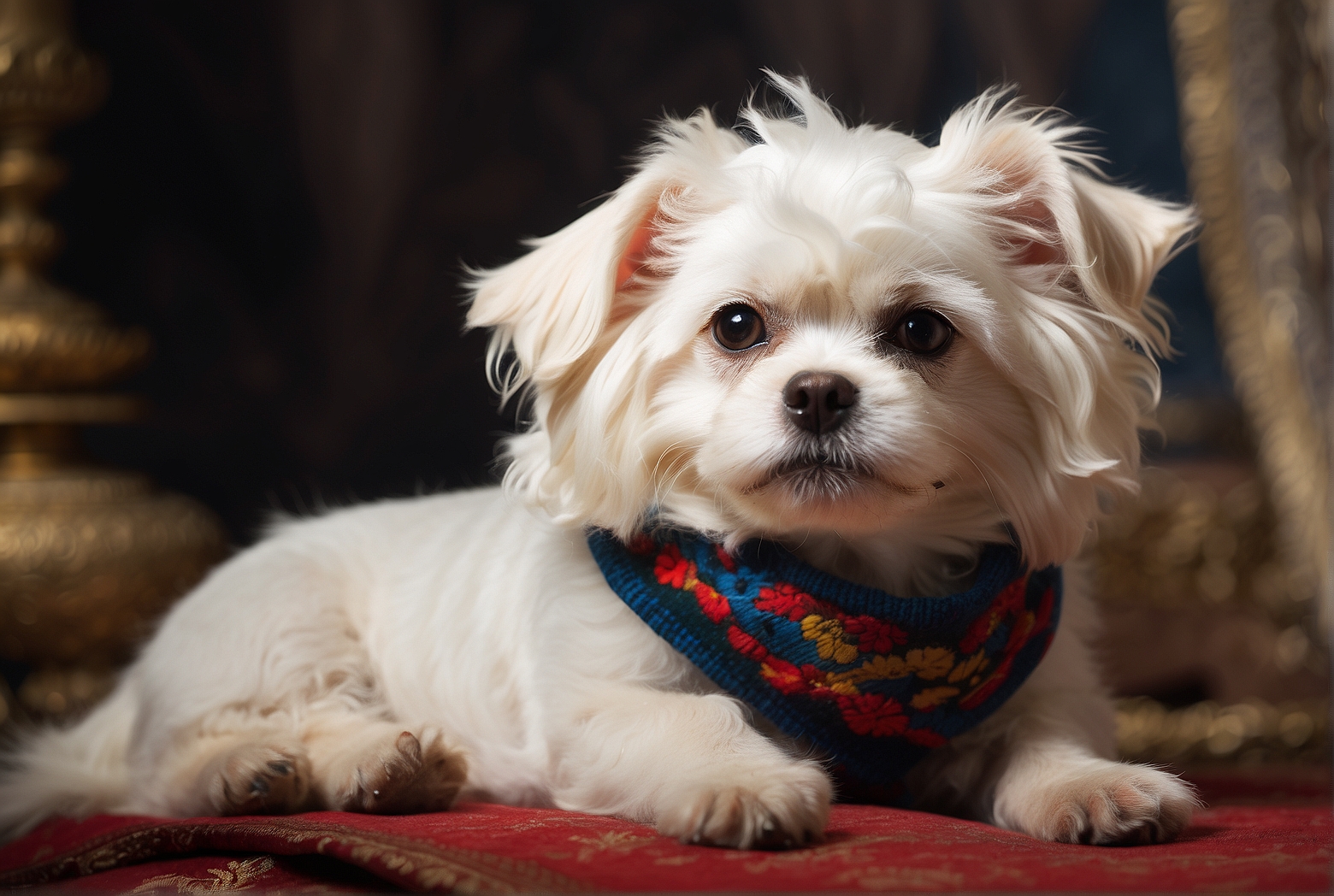Imagine having a Maltese as a loyal companion, always by your side, exuding love and affection. But what if there was a chance that this small, fluffy ball of fur could turn on you? In this article, we explore the intriguing question of whether a Maltese dog has the potential to turn on its owner. We’ll delve into their temperament, training requirements, and provide valuable insights to help you understand these delightful canines better. Prepare to unravel the fascinating world of Maltese behavior and discover the truth behind their loyalty and devotion.
Understanding Maltese Temperament
The Maltese breed characteristics
The Maltese is a small toy breed known for its long, silky white coat and loving nature. These dogs typically weigh between 4 to 7 pounds and stand around 8 to 10 inches tall. Despite their small size, Maltese dogs are confident, playful, and eager to please their owners. They are known for their loyalty and make excellent companions.
Breed temperament and behavior
Maltese dogs have a gentle and affectionate temperament. They are known for their sweet nature and desire to be around their owners as much as possible. They thrive on human companionship and tend to form strong bonds with their families. Maltese dogs are generally friendly and well-suited for families with children, as long as they are properly trained and socialized.
Factors that may influence behavior
While the Maltese breed is generally known for its good temperament, several factors can influence a dog’s behavior, including genetics, environment, and early experiences. It’s important to understand these factors and take them into consideration when raising a Maltese.
Factors That Can Contribute to Aggression
Lack of socialization
Proper socialization is crucial for any breed, including the Maltese. If a Maltese is not exposed to various people, animals, and environments at an early age, they may become anxious or fearful in new situations, which can potentially lead to aggressive behavior. It is essential to expose your Maltese to different experiences in a positive and controlled manner.
Negative experiences or traumas
Negative experiences or traumas can have a lasting impact on a dog’s behavior. If a Maltese has been subjected to abuse, neglect, or other traumatic events, they may develop fear-based aggression as a defense mechanism. It is important to provide a safe and nurturing environment for your Maltese and address any past traumas with patience and understanding.

Lack of training or discipline
Like any other dog, Maltese dogs need consistent training and discipline to understand and follow the rules of the household. Without proper training and boundaries, a Maltese may exhibit unruly and potentially aggressive behavior. It is essential to establish clear rules, boundaries, and provide positive reinforcement to shape their behavior.
Health issues or pain
Undiagnosed health issues or underlying pain can also contribute to aggression in Maltese dogs. If your Maltese is behaving aggressively out of character, it is important to consult with a veterinarian to rule out any potential health problems. Addressing any underlying medical issues can help improve their behavior and overall well-being.
Warning Signs of Aggression
Growling or snarling
Growling or snarling is a clear sign of aggression in any dog. If your Maltese displays these behaviors, it is essential to take it seriously and address the root cause of their aggression. It could be an indication of fear, discomfort, or possessiveness.
Biting or nipping
Biting or nipping is another warning sign of aggression. While small bites or nips may seem insignificant due to the Maltese’s small size, it is important not to dismiss this behavior. Biting can cause harm, and addressing it promptly is crucial to prevent further escalation.
Showing signs of fear or anxiety
Maltese dogs may display aggression when they are feeling fearful or anxious. Watch for signs such as trembling, pacing, excessive panting, or tucking their tail between their legs. If your Maltese consistently shows signs of fear or anxiety, it is important to provide them with a safe and secure environment and seek professional help if needed.
Displaying possessive behavior
Possessive behavior, such as guarding toys, food, or territory, can be a sign of aggression in Maltese dogs. It is important to establish boundaries and provide consistent training to address possessiveness and prevent potential aggression.

Preventing Aggressive Behavior
Early socialization and exposure
Early socialization is key to preventing aggression in Maltese dogs. Expose your puppy to various people, animals, and environments from a young age, using positive reinforcement to create positive associations. This will help your Maltese feel confident and comfortable in different situations, reducing the risk of aggression.
Positive reinforcement training
Positive reinforcement training is an effective approach for training Maltese dogs. Rewarding good behavior with treats, praise, and playtime encourages them to repeat desirable actions. Using positive reinforcement techniques can create a strong bond with your Maltese and reinforce their good behavior, minimizing the likelihood of aggressive tendencies.
Consistent and fair discipline
Consistency and fairness in discipline are important when training a Maltese. Establish clear rules and boundaries, and use positive reinforcement to encourage good behavior. Avoid harsh punishment or physical reprimands, as this can cause fear or aggression.
Identifying and addressing potential health issues
Regular veterinary check-ups are essential to ensure your Maltese’s health and well-being. If your Maltese displays unexpected aggression, it is crucial to consult with a veterinarian to rule out any possible underlying health issues. Addressing any medical concerns can help resolve behavioral problems.
Managing Aggression in Maltese
Consulting with a professional dog trainer
If your Maltese exhibits aggressive behavior that you are unable to manage on your own, it is advisable to seek professional help. A qualified dog trainer with experience in handling aggressive behaviors can work with you and your Maltese to develop a personalized training plan and provide guidance throughout the process.
Separating the dog from triggering situations
To prevent aggressive incidents, it may be necessary to separate your Maltese from situations or stimuli that trigger their aggression. This could include avoiding interactions with certain individuals or animals, or creating a safe space for your Maltese to retreat to when feeling stressed or overwhelmed.
Using reward-based training methods
When managing aggression in Maltese dogs, it is important to continue using reward-based training methods. Rewarding desired behaviors and redirecting their attention away from triggers can help modify their behavior over time. Patience and consistency are key when working with an aggressive Maltese.
Seeking help from a veterinarian
In some cases, aggression in Maltese dogs may require a multi-disciplinary approach. Your veterinarian can work together with a professional dog trainer or animal behaviorist to develop a comprehensive plan to address the underlying issues causing aggression. It is important to follow their guidance and recommendations to ensure the safety and well-being of your Maltese.
Common Misconceptions
Small size does not equal non-aggression
Despite their small size, Maltese dogs are not immune to aggression. Size does not determine a dog’s temperament or potential for aggression. It is essential to treat all dogs, regardless of their size, with care, respect, and proper training.
Not all Maltese dogs will turn on their owners
While aggression can occur in any dog breed, it is important to remember that not all Maltese dogs will turn on their owners. A well-socialized and properly trained Maltese is unlikely to exhibit aggressive behavior towards their owners or other individuals.
No breed is inherently aggressive
It is important to note that no breed is inherently aggressive. A dog’s behavior is influenced by a combination of genetic factors, early experiences, socialization, and training. With proper care, training, and socialization, any breed, including the Maltese, can be well-mannered and friendly.
Seeking Proper Training and Socialization
Enrolling in obedience classes
Enrolling your Maltese in obedience classes can provide them with structured training and an opportunity to socialize with other dogs and people. Working with a professional trainer in a controlled environment will help shape their behavior and instill good manners.
Exposing Maltese to various environments and people
Socializing your Maltese with various environments, people, and animals is crucial for their overall development. Gradually introduce them to new experiences, ensuring they remain calm and positive. This exposure will help them become well-adjusted and confident in different situations.
Creating a positive and safe home environment
Creating a positive home environment is essential for a well-behaved and non-aggressive Maltese. Provide them with a comfortable and safe space, free from any potential triggers or stressors. Establish consistent routines and enforce positive behaviors through rewards and praise.
Consistently reinforcing good behavior
Consistency is key when reinforcing good behavior in your Maltese. Continue to use positive reinforcement techniques and reward them for desirable actions. Reinforcing good behavior consistently will help them understand what is expected of them and minimize the chances of aggression.
The Importance of Responsible Ownership
Understanding individual dog’s needs
Each Maltese is a unique individual with specific needs. It is important as an owner to understand and cater to their individual needs, including exercise, mental stimulation, and social interaction. Meeting these needs will contribute to a well-balanced and non-aggressive Maltese.
Providing mental and physical stimulation
Mental and physical stimulation is crucial for preventing boredom and frustration, which can contribute to aggressive behavior in Maltese dogs. Engage your Maltese in interactive play, provide puzzle toys, and introduce them to new experiences to keep their minds and bodies active.
Being aware of and addressing any behavior changes
As a responsible owner, it is important to be vigilant and attentive to any changes in your Maltese’s behavior. If you notice any signs of aggression or other behavioral issues, it is essential to address them promptly. Seek professional help if needed, and never ignore or dismiss behavioral changes in your Maltese.
When to Seek Professional Help
Persistent and severe aggression
If your Maltese displays persistent and severe aggression, it is crucial to seek professional help from a dog trainer or behaviorist. They will assess the situation, develop a tailored treatment plan, and provide guidance on managing and modifying your Maltese’s behavior.
Aggression towards children or vulnerable individuals
Aggression towards children or vulnerable individuals is a serious concern that requires immediate attention. The safety of those around your Maltese should be the top priority. Consult with professionals who specialize in working with aggression cases and create a plan to ensure a safe environment for everyone involved.
Repeated instances of biting
Repeated instances of biting, regardless of the severity, should always be taken seriously. It is vital to address the root cause of the biting behavior and work with professionals to manage and modify it. Seeking help from an experienced dog trainer or behaviorist can prevent future incidents and ensure the well-being of everyone involved.
Conclusion
Proper training, socialization, and responsible ownership play an essential role in preventing aggression in Maltese dogs. Understanding the breed’s temperament, addressing warning signs, seeking help when needed, and creating a positive and safe environment are all crucial components of responsible ownership. With patience, consistency, and the right approach, aggression can be managed and minimized, allowing your Maltese to thrive as a happy and well-behaved companion.
